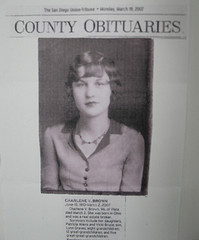Dying to Write
July 27th, 2007 by Larry Smith One of our storytelling obsessions here is obits, the last word (officially, at least) on someone’s life story. To mark her fourth year on the job, the obituaries editor of The Economist has been keeping a journal on how the death beat has changed her way of seeing life. “I don’t know what other people’s first thoughts may be on Monday mornings; but mine, as the jabber of my husband’s radio crawls into my dreams, is ‘Has anyone died today?’” Ann Wroe offers in the first of her entries. “It was never so before I became The Economist’s obituaries editor, four years ago. But death comes naturally now. It is matter-of-fact. I keep a list, very incomplete, of those who are creeping towards it. I notice its mark on people, not so much in wrinkles or stooped backs but in a certain frailty and luminosity acquired by the very old before they die.”
One of our storytelling obsessions here is obits, the last word (officially, at least) on someone’s life story. To mark her fourth year on the job, the obituaries editor of The Economist has been keeping a journal on how the death beat has changed her way of seeing life. “I don’t know what other people’s first thoughts may be on Monday mornings; but mine, as the jabber of my husband’s radio crawls into my dreams, is ‘Has anyone died today?’” Ann Wroe offers in the first of her entries. “It was never so before I became The Economist’s obituaries editor, four years ago. But death comes naturally now. It is matter-of-fact. I keep a list, very incomplete, of those who are creeping towards it. I notice its mark on people, not so much in wrinkles or stooped backs but in a certain frailty and luminosity acquired by the very old before they die.”
Later she continues:
In this strange age―where we fear death from left-behind back-packs and parked cars, and where we watch the deaths of strangers on the evening news but shrink from attending the deaths of our friends―obituarists have the easier cases. I deal generally with natural mortality in lives full of years and doings. But whether death comes slowly and privately, or randomly and publicly, its cause is not what most interests me. The vital question is, what next?
Speaking of heady stuff, earlier this week I hung on every word of Michael T. Kaufman’s obit of the controversial psychotherapist Albert Ellis. Whether you’re in therapy or not, believe shrinkage brilliant or bunk, you’ll find a spin through this man’s life a trip.
Obit image from Flickr’s Anna Banana.




